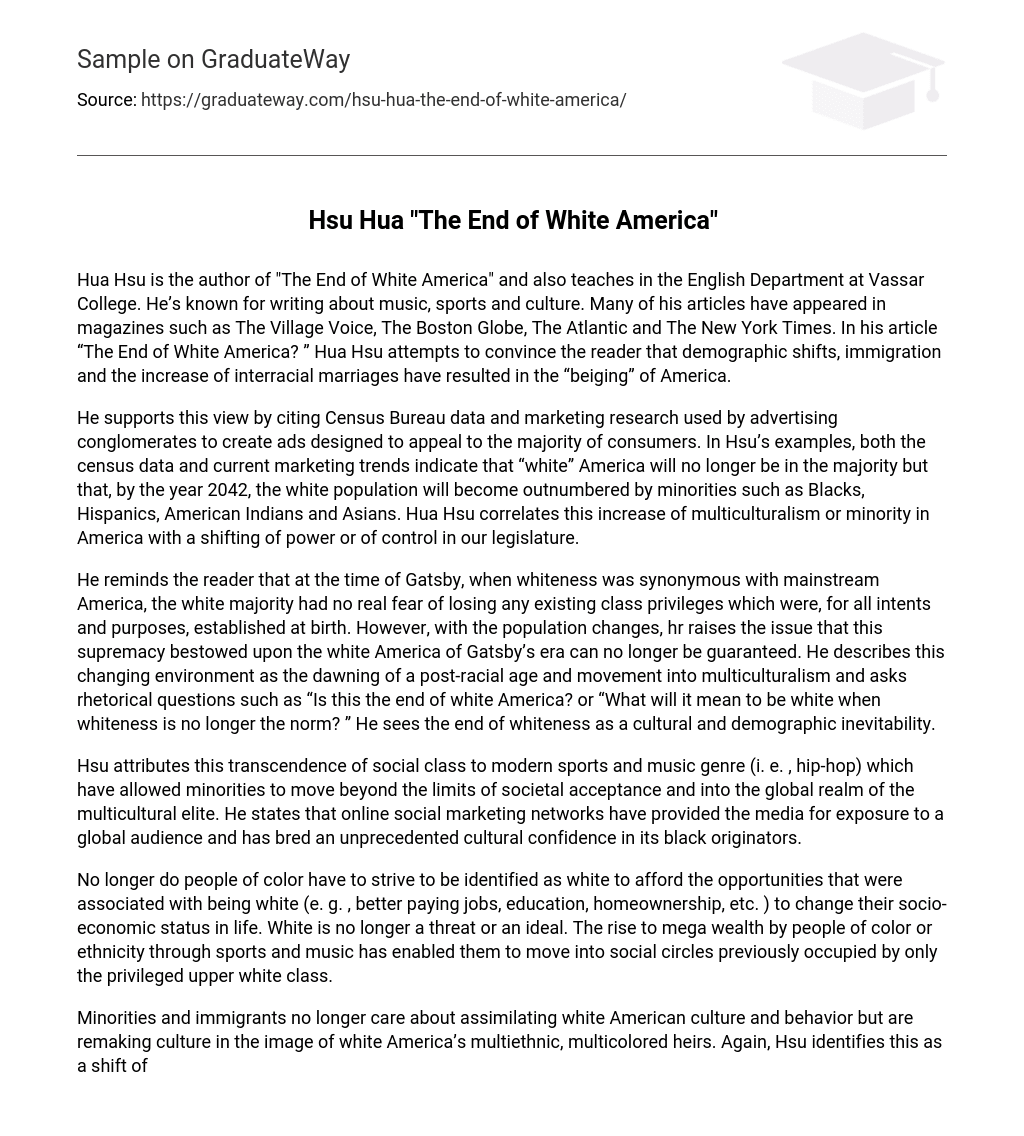Hua Hsu, a professor in the English Department at Vassar College and author of “The End of White America”, is well-known for his writings on music, sports, and culture. He has contributed articles to magazines such as The Village Voice, The Boston Globe, The Atlantic, and The New York Times. In his article titled “The End of White America?”, Hua Hsu seeks to convince readers that the United States’ evolving demographics, immigration trends, and increased number of interracial marriages have resulted in a more diverse and complex nation.
According to Hua Hsu, he substantiates his belief by referencing Census Bureau data and marketing research employed by advertising conglomerates to create advertisements tailored to appeal to the majority of consumers. Hsu provides examples that demonstrate how both the census data and current marketing trends indicate that the white population in America will no longer constitute the majority. Instead, by 2042, minorities like Blacks, Hispanics, American Indians, and Asians will outnumber the white population. Additionally, Hsu connects this rise in multiculturalism or minority representation in America to a change in power or control within our legislature.
In the time of Gatsby, being white signified membership in mainstream America and having a secure hold on class privileges that were bestowed at birth. However, the author argues that due to changes in the population, white America’s dominance during Gatsby’s era is no longer assured. The author labels this transformation as the emergence of a post-racial era and a shift towards multiculturalism. They raise thought-provoking queries such as “Will this mark the demise of white America?” and “What does it signify to be white when whiteness ceases to be customary?” The decline of whiteness is perceived as an unavoidable consequence of cultural and demographic transformations.
Hsu contends that modern sports and music genres, like hip-hop, have had a notable impact on empowering minorities to overcome societal limits and join the multicultural elite worldwide. Hsu argues that online social marketing networks have served as a medium for introducing these minorities to a global audience, leading to an unparalleled cultural confidence among black innovators.
Historically, individuals from diverse backgrounds had to assimilate into white culture to access the benefits traditionally linked with whiteness, such as improved job prospects, education, homeownership, and more. However, the perception of white as either intimidating or ideal has evolved. By achieving success in sports and music, individuals of color or varying ethnicities have obtained substantial wealth and entry into social spheres formerly reserved for the privileged white upper class.
The text claims that minorities and immigrants are no longer interested in assimilating into white American culture. Instead, they are reshaping culture to mirror the diverse image of white America. Hsu suggests that this shift signifies a transfer of power from white individuals. He includes concerning statements in his article, such as the notion that colored migration poses a threat to every region dominated by white people. As evidence, he points to Barack Obama’s election and argues that it demonstrates the gradual disappearance of “whiteness” in America. Additionally, he defines whiteness as the key characteristic of being American.
According to Hsu, in contemporary America, being white is no longer viewed as advantageous but rather as lacking culture. He argues that liberal white individuals are responding to this change by distancing themselves from their whiteness and adopting black behavior and culture. Those who do not distance themselves from their whiteness deal with their discomfort towards change or the unfamiliar by finding solace in their whiteness. Hsu highlights the revival of cultural unity among lower-middle-class whites, who strive to regain a sense of American authenticity or a past era. This resurgence of “white America” is demonstrated through the increasing popularity of country music and NASCAR, both of which have expanded beyond elite social circles.
Hsu acknowledges that the current surge of racial pride and xenophobia can be compared to past movements, such as the equal rights movement in the 1960s and the promotion of multiculturalism in the 1990s. However, Hsu also recognizes that society’s perception of minorities has significantly changed since the 1920s when Gatsby’s era took place. This change is credited to the civil rights movement of the 1960s which empowered minorities to achieve positions of authority and influence.
According to Hsu, the fear of white America becoming a minority is connected to their anxiety about losing their perceived entitlements and control to people of color. This unfounded fear has resulted in different types of identity politics throughout the 20th century as white working class individuals believe that the system that once provided stability for them has veered off course.
Hua Hsu’s article addresses the impact of demographic changes on racial hierarchies and cultural attitudes towards individuals. According to Hsu, these shifts can result in a more equitable distribution of power across racial lines and foster a culture that values individuality over group membership. The author emphasizes the importance of cultural diversity in promoting equal treatment for all. In summary, Hsu aims to educate readers about ongoing socio-economic transformations and their potential positive effects on American society.
The text implies that multiculturalism is causing an increase in fear among white Americans due to the changes and potential consequences it brings. Nonetheless, the author effectively argues that multiculturalism can promote equality for all Americans. However, there is a lack of evidence supporting this fear or directly connecting it to the growing number of minorities in America. Furthermore, there is inadequate substantial evidence backing the notion that multiculturalism will result in a transfer of power or control over the country.
While I found this article interesting and somewhat informative, Hsu’s conclusions unintentionally provided amusement. The deliberate use of terms like “menacing” aimed to evoke an emotional reaction, however, the arguments presented lacked logical reasoning and contained broad generalizations without sufficient supporting evidence.





